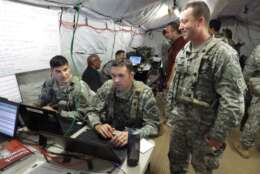National & World Headlines
-
The Defense Department and Army are changing the way they hire and train acquisition professionals.
October 13, 2017 -
The Army Materiel Command is working with its vast supply chain to tighten things up in a methodology known as prepositioning.
October 13, 2017 -
U.S. Army Africa is helping to bolster American interests there, without having a whole lot of soldiers to do it.
October 13, 2017 -
U.S. Army North has a short roster of permanent billets, but it has big leverage when help is needed, like with hurricane cleanup in Puerto Rico.
October 12, 2017 -
The Defense Department is strongly urging lawmakers to give it the authority to resume responsibility for its own security clearance process. Lawmakers, however, are skeptical.
October 12, 2017 -
As the Defense Department plans to split its acquisition office, it's planning on using existing authorities to take a bite out of contracting time.
October 11, 2017 -
On this episode of CyberChat, host Sean Kelley, former chief information security officer at the Environmental Protection Agency and deputy chief information officer at the Veterans Affairs Department, addresses medical device cybersecurity.
October 11, 2017 -
Leading the Army's reevaluation of its facilities is Randy Robinson, the acting assistant Army secretary for installations, environment and energy.
October 11, 2017 -
The human side of the Army is in large measure the responsibility of Lt. Gen. Thomas Seamands, the deputy chief of staff.
October 11, 2017 -
The Defense Department has been exploring how it might transfer security clearances for DoD personnel from the National Background Investigations Bureau (NBIB) to the Defense Security Services (DSS).
October 11, 2017 -
The Army says its new plan to modernize networks differs from past efforts because it's "threat-informed" by recent developments in modern warfare.
October 11, 2017 -
Multiple high-ranking military officials have come out against the ban, and lawmakers want to know who advised the president.
October 10, 2017 -
The Army has launched a four-month project to create a new "modernization command," and plans to have it fully functional by next summer.
October 10, 2017 -
The Navy has to figure out how to harness, organize and deliver its data to users before it can start utilizing that data for decision making.
October 10, 2017 -
The Navy plans to release a draft RFP for an enterprise cloud contract by the end of 2017, saying most systems — including secret ones — will move to the cloud.
October 10, 2017















